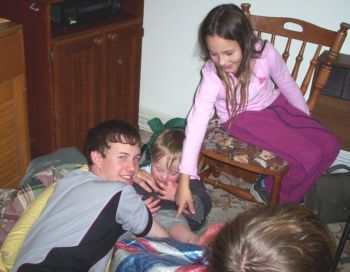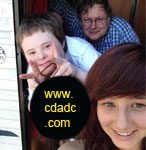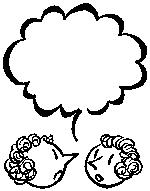

DOWN SYNDROME SPEECH THERAPY – DEVELOPING SPEECH AND LANGUAGE IN THOSE WITH DOWN SYNDROME.
Speech therapy suggestions and directions you can take with Down Syndrome kids, teenagers and adults.
|
|
Topics covered on this webpage include:
1… Down Syndrome HEARING AND SPEECH Therapy;
3… SPEECH DEVELOPMENT in kids with Down Syndrome: Some AGE RELATED SPEECH GUIDELINES;
4… Down Syndrome, Speech Therapy and SHORT TERM MEMORY PROBLEMS and;
5… Down Syndrome and SPEECH ACQUISITION DURING THE TEENAGE AND ADULT YEARS.
1…Hearing and Speech Therapy in those with Down Syndrome:
For proper speech development in those with Down Syndrome, it appears vitally important to make sure Down Syndrome kids and adults can hear well after every cold, after every ear infection etc. Perhaps the most important thing your speech therapist can do for your kid with Down Syndrome, is check your kid’s hearing every three months or more often if required. If the kid cannot hear properly, then the kid’s speech will likely be poor or jibberish.
Hearing loss will affect up to 70% of babies and kids with Down Syndrome during their early years. What can happen is this: Kid picks up a cold from someone, nose starts running, because the tube that connects the ear and nose together to allow the ears to drain is more horizontal in those with Down Syndrome, the fluid tends not to drain out and then it causes Glue ear. Having glue ear is like listening to speech with one’s head underwater – very difficult. Hence speech can become afected as the kid cannot hear the sounds correctly to learn them in the first place. If hearing is left impaired, speech / language is expected to be gravely affected. It is one of those domino health effects of Down Syndrome.

2…James MacDonald, Speech Therapist and his approach to developing speech in those with Down Syndrome:
A note about speech development and Down Syndrome from another parent, Mark Russo: “…Just a quick note about Jacob saying words and not repeating it again — my Zack does that too! It is bothersome when we want language so much from our kids, but encouraging too to know that he at least can say things.
I am on a list serve that deals with late-speaking kids, obviously Jacob is by no means late speaking at 7 months (!!!) but it may be of interest to check out the info on the web site in the very least. I have found it helpful to be able to “work” on communication paths with this info by following Zack’s sounds and gestures and sometimes words to encourage him. The gentleman’s name is Dr. James D. MacDonald, he is a U.S. speech therapist with a doctorate degree researching how to begin communicating with Down Syndrome, autistic and other speech-delayed kids. He has been studying kids for at least 20 years…”.
It is a really good site on speech therapy and Down Syndrome, but remember to go through all the links to extract the heaps of useful information that is there. A few of the main points on Down Syndrome and speech therapy were:
Play with your kid, then engage in a two way conversation, giving your kid plenty of time to respond in [remember that eye contact is important too]. Encourage the kid’s attempts at speech, so that he is reinforced to keep trying. Playing with your kid is extremely important for speech acquisition and for developing appropriate obedience and respect from your child.
Secondly, although kids with Down Syndrome may be outgoing and friendly as under four’s, by the time they reach 5 or 6 years, some will become very withdrawn in their speech and personality because they didn’t gain access to social development with kids of similar age from essentialy the time they were born – they need much more social interaction and social stimulation in the first four years of life if they are to interact appropriately and develop speech better when they are aged five and above.
Thirdly, some Down Syndrome kids become withdrawn at school because teachers and others put an emphasis on kids learning more and more words e.g. in English, reading, mathematics – being school word focused so to say – whereas the kid actually needs to work with speech with the social words he is comfortable in using and is comfortable to being spoken to in.
That was three main points that stood out to me about Down Syndrome and speech therapy. There is alot more on James MacDonald’s website on Down Syndrome and speech therapy than this. His language website can be found through my Links Page.
I would strongly suggest that if you are a parent or teacher of a kid with Down Syndrome, that you start using the appropriate age related speech therapy suggestions of James MacDonald. Kids with Down Syndrome have an up hill battle with speech and peer acceptance. The earlier these can be remedied the better.
3…Speech Development In Down Syndrome: Some Age Related Language Guidelines and Norms
Speech development, or lack of it to be more precise, is one of the most troublesome delays that kids with Down Syndrome have. As there was a lack of guidelines out there about speech development for those with Down Syndrome, I decided to add this section. It is based on an article by Sue Buckley “Improving the speech and language skills of kids and teenagers with Down Syndrome” Down Syndrome News and Update, Vol1, No.3, pp111-128, Great Britain. I would suggest that you may like to get a copy of this article for yourself.
Non-Down Syndrome kids say their first word around the 1 year old mark, 11 words by 17 months, learn about 25 words a month till 2 years of age. At age 5years, 2,000 words is their vocabulary. 3,000 words per year is added between 7 and 16 years of age. When a kid has 50 or more words, they then begin to join words together eg “big boy”. When the vocabulary reaches 300 words (around 2 years 3 months of age), they then start using grammar – plurals, questions etc. 300 words may be the “critical mass” for the productive grammar to begin.
Kids with Down Syndrome tend to follow the non-Down’s Syndrome pattern of speech development, except it occurs at a much slower pace and speech can remain very difficult to understand, particularly by those unaccustomed to the poor sound development.
For Down Syndrome kids the typical language pattern is 18 months of age for the first spoken word 2 years 3 months for 11 words, have 50 words around 3 years and one month of age. Approximately 3% have no speech vocabulary when they are teenagers.
4… Speech therapy and Down Syndrome Short Term Memory Problems:
Finally, Jacob has at times shown very advanced learning, it lasts only a few minutes and may be spread over several days, before it just vanishes, but it is months ahead of his chronological age. Two examples: With speech he called out “mummy” very clearly on several occasions when he was ill in his cot at about age 3 months and; he has shown attachment behavior that was typical of someone many months older than himself. There appears to be some sort of rapid development that is lost almost immediately it is gained. I feel that this may be very beneficial to understanding learning in people with Down Syndrome, if we can grasp it and understand it ourselves. Going on the genetic nature of walking, we may be missing windows of genetic opportunity with these behaviours, especially with language development.
Updating the speech / language concern noted above, I found out when I took Jacob to see a neurologist in Dec., 2003, (Jacob aged 3years, 11months) that Jacob has auditory short term memory difficulties; he forgets how to say the word before he has mastered it. It is a form of dispraxia. We now need to work around this for his speech to develop – it wasn’t that the genetic opportunity with language was lost, though that is still a possibility, but appears to be more a short term memory problem with remembering how to express new words. Our entire strategy for his speech development would have been very, very different. The importance of speech repetition would have been emphasised a lot, lot, lot more. Take note with your own kids – there are many who have kids with Down Syndrome who don’t have the short term auditory memory problem, so they can say this or that speech strategy worked for them and that you should use their speech strategy, but it wont necessarily work for your kid with Down Syndrome.
Down Syndrome and speech therapy will both go hand in hand for some time yet to come.
Jacob knows the words, he understands the words, the speech, but it is really hard for him to get any speech to come out intelligibly – it’s a form of dispraxia. The speech therapists / pathologists / DS worker failed to diagnose this speech problem for the first four years of his life – so he has only just started to receive treatment for it – it’s an uphill battle, everyone seems to be stuck in wanting to sign or use pictures with him, when the neurologist said what he needs is lots of language repetition.
We now know that although James MacDonald’s speech therapy appears to be a good one, that Jacob needed alot more speech repetition and so on. As I learn more about how to work around Jacob’s auditory short term memory problem, I will post here about it. [It’s now February, 2004, this is turning out to be a very hard thing to help him through].
The big identifier with Jacob and his short term memory problem was when he said “wake up Geoff” perfectly clearly, but by the time his fourth or so repitition had happened in rapid order, the words had become incomprehensible. Our hearts sunk, but this was the key that told us to look further than speech therapists, Down Syndrome workers and so on. Luckily our doctor took it seriously enough to refer Jacob to a neurologist and the neurologist listened when I said it was more than just environmental factors.
By way of update, Down Syndrome kids, when they start attending normal school, will often surge ahead in their speech generation. Jacob’s speech development has surged ahead since starting normal school, which suggests a great speech treatment for Down Syndrome kids which are older, is simply enrollment in a normal school.
5… DOWN SYNDROME SPEECH ACQUISITION DURING THE TEENAGE AND ADULT YEARS
1… Essentially, Sally Miles et al., Year 2002 study, indicated that teenagers / adolescents and young adults with Down Syndrome, have a better comprehension of language than their verbal language suggests, which in turn suggests that aditional education to build up their expressive language abilties may be beneficial.
2… The Robin Chapman et al., year 2002 study, essentially found that continued language training, in both comprehension and expression, should continue during the teenage and young adult years.
6… QUESTION AND ANSWERS ON DOWN SYNDROME AND SPEECH
APRAXIA of Speech
Verbal apraxia or dyspraxia
Apraxia and Down Syndrome Question:
Please note, names altered for identity reasons.
Apraxia and Down Syndrome Answer:
Apraxia and Down Syndrome Answer from another parent:
Hi,
I’ve been browsing your site, nice to see somebody being sceptical aboout popping vitamins to cure Down Syndrome. There is a charity here in the UK that raised a lot of money to run studies on TNI, then didn’t publish the results, just tried to raise money for more studies. I’ve heard tell that the charity was run by a TNI nut, and when they didn’t get the positive results they wanted insteda of publishing they just thought they’d try again. Not the most ibjective scientific approach!
Anyway, apart from admiring your candour on the vitamin thing, I was actually writing to ask if you’d come across the reading studies Professor Sue Buckley has done?
One of your pages talks about improving apparent IQ by improving memory through reciting strings of numbers. I think another way to improve apparent IQ is targeting speech.
People are judged a lot by how they speak, and a lot of people with Down Syndrome don’t do it well.
Sue Buckley has been working on teaching reading early to children with Down Syndrome. Our daughter Mary was 3 this month, she knows most of her letters (still has trouble telling b from d, but knows the rest), and is starting to read short words & simple sentances like “I can play”.
The theory is that people with Down Syndrome are strongly visual learners, so they can learn to speak better by learning to read.
When you hear a sentance it goes in your auditory short term memory, and if that isn’t good then the chances are it decays away before you’ve figured it out.
In contrast when you read a sentance it’s still there in the page for you to re-read as often as you like. You can take it slow or fast according to your capabilities, where speech just comes at you as fast as the speaker cares to send it. So it is much easier to learn new words, and new sentence structures from reading rather than hearing.
Similarly if you are missing out on hearing a word correctly, either through poor hearing or poor auditory memory, you will find it easier to get it from reading. As an example I could not get Mary to say “banana”. She would say “nana” no matter how often I said it, tapped out the rhythm, or clapped out the syllables, but the first time she read it she read “nana”, I pointed out the “ba” and she smiled sweetly and said “banana”.
Thinking back to when I learnt foreign languages I always found it easier to get the words by reading, so why shouldn’t somebody who is having trouble with their native language find reading easier too?
It seems to be working with Mary, she is definately behind her peers in the length of sentences she comes up with (Mean length of utterance is below age norms, to use the jargon), but her speech is clearer than average for her age, and she certainly speaks far better than is expected of children with Down Syndrome.
I also think that people tend to underestimate her because she has Down Syndrome.
I’m hoping that if I can deliver her to school already reading it will give a boost to people’s perception of her, and help her own self image, so that she isn’t written off from the start. I think low expectations are usually a self fulfilling prophecy, so I want to do what I can to target that early on.#
You mention that Jacob has a problem with auditory short term memory. This is thought to be very common in people with Down Syndrome, and visual learning through learning seems to be a good way to get around this problem.
The auditory memory improves with age, but it seems to stay behind what would be expected for the age, so teaching through reading is likely to benefit even older people with Down Syndrome.
So perhaps you might put a note about reading as a treatment for Down Syndrome next time you’re revising your pages?
I noticed you had come across one paper from Sue Buckley on your site. In case you don’t know she runs the Down Syndrome Edcucation Trust, and you can find out more about the work they have been doing at http://www.downsed.org/
Hope something I’ve written might be of use to you. Thanks again for taking the time & trouble to put your web site up, be assured it is appreciated!


Leave a Reply
You must be logged in to post a comment.